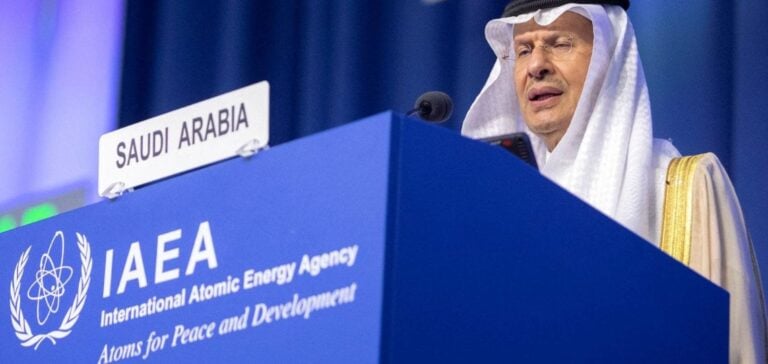Saudi Arabia recently announced its intention to change its cooperation framework with the International Atomic Energy Agency (IAEA) from a Small Quantities Protocol (SQP) to a Comprehensive Safeguards Agreement (CSA) by the end of 2024.
This change marks a significant step in the Kingdom’s nuclear policy, as it seeks to enhance the transparency of its nuclear activities while complying with international non-proliferation standards.
This decision is seen as a response to growing pressure from the international community, which is calling for greater rigor in monitoring nuclear programs, particularly in a region as volatile as the Middle East.
The SQP, which applies to states with limited nuclear activities, allows a degree of flexibility in terms of declaration and inspection.
By contrast, the move to a CSA implies regular inspections and increased monitoring by the IAEA, guaranteeing that a country’s nuclear activities are exclusively peaceful.
This change is also interpreted as Saudi Arabia’s desire to position itself as a responsible player on the international stage, in response to criticism of its nuclear ambitions.
Implications for Saudi Arabia’s Nuclear Program
The Saudi nuclear program, while still in its infancy, has ambitions that could include sensitive activities such as uranium enrichment.
By adopting a CSA, Saudi Arabia is seeking to establish a climate of trust with the international community, in order to avoid any further sanctions or pressure.
This is all the more crucial in the context of past statements by Crown Prince Mohammed bin Salmane, who has raised the possibility of developing nuclear weapons in response to a possible Iranian nuclear program.
However, the question of signing the IAEA’s Additional Protocol (AP) remains unresolved.
This protocol allows for unannounced, in-depth inspections, and its absence could raise concerns about the true transparency of Saudi nuclear activities.
The international community may continue to express reservations until such a commitment is made, which could limit the effectiveness of the safeguards offered by the CSA.
Geopolitical context and regional implications
Saudi Arabia’s announcement comes against a tense geopolitical backdrop, marked by Iran’s nuclear ambitions.
Regional dynamics are influenced by fears of a nuclear arms race, where Saudi Arabia may feel compelled to develop its own nuclear capabilities if Iran pursues its program.
By opting for a CSA, the kingdom seeks to demonstrate its commitment to non-proliferation while preserving its strategic options.
Relations between Saudi Arabia and the IAEA are also at stake.
Rafael Grossi, Director General of the IAEA, welcomed the decision as a positive step, but Riyadh’s reluctance to sign the Additional Protocol could create tensions with Western partners, notably the United States and the European Union, who favor stricter monitoring measures in high-risk regions.
Related problems and anticipated challenges
The transition to a CSA raises questions about transparency and international confidence.
Although this change is seen as progress, the failure to sign the Additional Protocol could fuel doubts about Saudi Arabia’s true intentions.
Effective monitoring is essential to building confidence, especially in a context where the kingdom’s nuclear ambitions are often compared to those of Iran.
In addition, developing nuclear capabilities requires significant investment in infrastructure and human skills.
Saudi Arabia will face logistical and financial challenges in complying with the requirements of the CSA, while ensuring that its nuclear ambitions are not perceived as a threat by its neighbors or the international community.
Perspectives and reflections
Saudi Arabia’s move to a Comprehensive Safeguards Agreement represents an important evolution in its nuclear policy, but it also raises complex questions about regional security and non-proliferation.
The kingdom’s ability to navigate this new environment will depend on its willingness to engage fully with the IAEA and guarantee the transparency of its nuclear activities.
The implications of this decision extend beyond Saudi borders, affecting the security dynamic in the Middle East and the stability of the global nuclear non-proliferation regime.
The next steps in this transition will be crucial in determining whether Saudi Arabia can truly position itself as a responsible player in the nuclear field, while preserving its strategic interests.






















